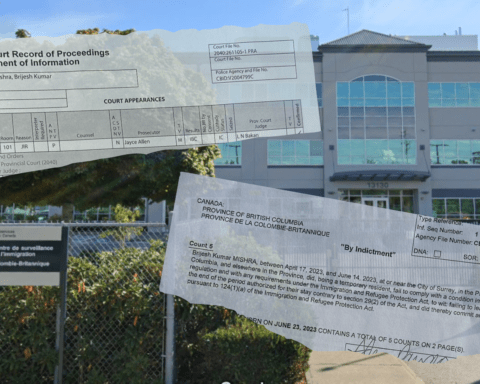Canada’s commitment to boost its live-in caregiver program as a pathway to citizenship has boosted the business of “nanny institutes” in Punjab.
Traditionally, people from Punjab have gone to Canada as farmers, plumbers, carpenters, electricians and welders.
For Punjabis dreaming of better opportunities abroad, a caregiver visa is now one of the best white collar ways to get into Canada, reported the Indian Express.
“Going to Canada as caregiver is a relatively new trend. After an initial boom, there was a downturn in 2009 when the processing time took much longer due to the increasing number of aspirants. Since last year, there is again a boom as rules were changed. Now a caregiver need not live with the family round-the-clock, but for a minimum eight hours in a day,” said Gursharan Sodhi, who runs the Chandigarh-based Cali Healthcare Resources (CHR).
There are about 10 institutes in the Chandigarh and Mohali areas alone offering the “nanny course”, charging between Rs 60,000 and Rs 90,000
The number of students in each class varies between 10 and 30.
A network of agents offers “packages” to the aspiring immigrants, complete with the “nanny” course and a job offer from Canada.
Armed with a certificate from a training institute, and a signed agreement of employment, a visa applicant can apply for a two-year work permit. After two years of working as a caregiver, the candidate is free to apply for a permanent residency and later citizenship in Canada.
Jatinder Kaur, 22, is an economics graduate from Kapurthala and is enrolled with Chandigarh Immigration. She described the course as “first aid, taking care of children and elderly, prescription reading”. And admitted that her goal is Canada.
“I will get a good salary and better environment there.”
Fellow student Sukhjeet Singh, a 25-year-old electrical engineer from Hoshiarpur and the son of a Punjab Police inspector, said there is no money in engineering jobs. “I worked as an engineer for three years. I was getting about Rs 20,000 as salary. As a nanny in Canada, I hope to easily make more than Rs 1 lakh.”
Immigration, Refugees and Citizenship Canada recently said it will have the backlog of permanent residence applications through the old Live-in Caregiver Program (LCP) largely cleared by the end of 2018.
In an announcement on Dec. 3, IRCC said its goal is to finalize 80 per cent of applications for permanent residence submitted on or before Oct. 1, 2017, by caregivers and their family members through the LCP.
“The commitments the government has made today will mean that many Live-in Caregiver Program applicants who have faced long delays and family separation may soon reach their goal of permanent residence,” Canada’s Immigration Minister, Ahmed Hussen, said in a news release.
“After diligently providing care for Canadians, they may soon be in the company of their own loved ones, together in Canada.”
The program provided foreign nationals with at least two years of full-time, live-in employment as a caregiver in Canada with a direct pathway to permanent residence. The program was closed in 2014 but thousands of caregivers who were working in Canada were given an extended opportunity to apply for permanent residence.
As many as 6,000 more applications for permanent residence under the LCP could still be submitted, IRCC says.
In its announcement, IRCC also committed to processing 80 per cent of new, complete LCP applications submitted on or after Oct. 1, 2017, within 12 months.
As of Oct. 1, 2017, IRCC said the number of caregivers and their family members waiting for their applications to be finalized had been reduced by 63 per cent. This reduction was due in part to additional resources that IRCC dedicated to processing the backlog of applications.
IRCC says this push has it on track to finalize 5,000 more cases than it had originally forecast for 2017. In total, 20,000 new permanent residents will be welcomed to Canada this year in the caregiver category.
IRCC also said that developments could soon be announced regarding a proposal to eliminate the $1,000 Labour Market Impact Assessment fee for Canadian families looking to hire a foreign worker to care for a person with high medical needs. The fee would also be eliminated for Canadian families with an income of less than $150,000, who are looking to hire a foreign worker to provide childcare.
But not all Punjabis who turn up in Canada as caregivers remain as such, and might switch to other jobs after becoming permanent residents, said an immigration expert in Chandigarh.
“The majority of Punjabi immigrants do not want to work at someone’s home abroad. Also, the many Punjabi families in Canada who give job offers do not want a nanny either. It has become a sort of business for many to charge money for paperwork. For others, it is a way to help relatives and friends enter Canada,” the expert, wishing not to be named, told Indian Express.
National Institute Chandigarh owner G L Kaushal said caregiver employers usually cross-check several times to ensure that the probable caregiver does the job diligently once abroad.
Students at the institutes confessed that they had tried unsuccessfully for US or Canadian visas earlier. “My family is settled in the United States. But the US turned down my visa twice citing that I was overage. There is no upper age limit for caregiver job,” said Rupinder Kaur, 26, who has come from Amritsar to the CHR institute.
A woman from Faridkot, with a B.Sc in Biotechnology, said her application for visa for Canada under the hairstylist category was rejected a few years back. She hid her B.Sc. qualification at the time of application. She is now trying again under the LCP.
Republished under arrangement with the South Asian Post.
The South Asian Post is Canada's premier English language Indo-Canadian newspaper.
The Post specialises in providing South Asian news and views from a Canadian perspective.
A print edition is published in Vancouver, British Columbia on a weekly basis, as well as an e-edition for the Calgary, Edmonton, Winnipeg, Toronto, and Montreal markets. As an Ontario South Asian newspaper, the South Asian Post covers weekly news from metropolitan areas like Toronto, Ottawa, Hamilton, and more.





I want to do job in Canada.. I m punjabi.. I have knowledge of punjabi